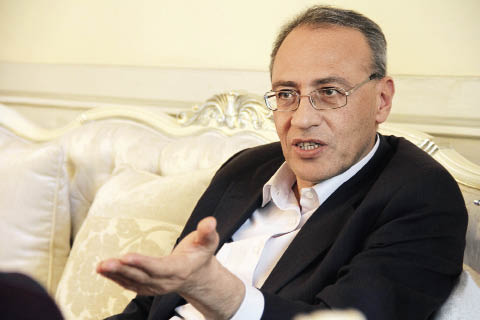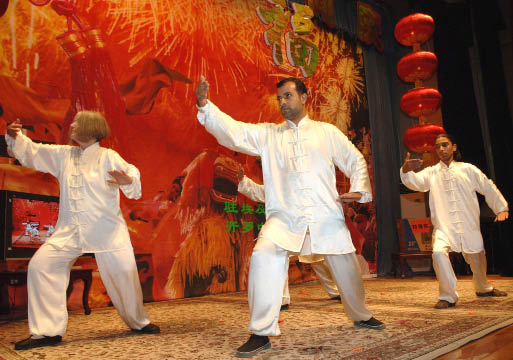Bilateral Relations between Egypt and China
By MAGDY AMER

RELATIONS between Egypt and China are not only the result of the modern era; they are rooted in history. There is no doubt that the similarities and rapprochement between the two civilizations show that their association originated long ago. Their links since ancient times were among the most important factors that helped to deepen and consolidate present relations and exchanges between the two countries. Both have ancient civilizations built on agriculture. They are aware of the strong connection and reverence their peoples have for their homeland and its soil. Neither has displayed colonial or expansionist tendencies and their relations with neighboring countries have always been peaceful and neighborly. As the two civilizations were associated in the past, the two countries are now linked by ties of friendship, cooperation, and exchanges based on mutual benefit, whether in bilateral relations or in cooperation at the international level.
As the two countries share many common interests, they should expand their cooperation and exchanges. China has, in recent years, become an exporter of investments, having formerly long been an investment destination. It is consequently looking for suitable markets and areas in this respect. Egypt, with its strategically important location and potential as regards physical and human resources, is one of the most suitable destinations for Chinese investment.
While China is looking for markets in which to invest, Egypt is at the same time attracting foreign investment in order to revive its economy. Chinese investments enjoy a big advantage because they could be described as “friendly to the environment and society.” China lays great store on maintaining development of the countries that receive its investments, protecting their social environments, and taking care not to drain their resources. Furthermore China is ready to transfer its technology, offer skills training, and use the local workforce. All these are advantages that promote a preference for Chinese investments.
As for China, it pays particular attention to Africa, and is keen to consolidate its ties of friendship and cooperation with African countries. Egypt is indeed the gateway to the African continent. Egypt is associated with African countries through agreements on trade exchanges and customs exemptions. These create many investment and industrialization advantages in Egypt as regards exports to African markets. Egypt is also close to the European market, which is one of the main destinations for Chinese exports. Projects and investments in Egypt could provide China with a springboard for the export of its goods and products to Europe.
Egypt and China also have a common interest in joining hands to address the threat of terrorism, which is no longer confined to the Middle East. Both countries support political and diplomatic efforts in the international arena because they have the same objectives: to achieve security, peace, and stability in the world; adopt the principle of resolving differences and problems through peaceful means and non-interference in the internal affairs of other countries; and to commit to the principles of international law and work under the umbrella of the United Nations. The latter is especially true in light of the growing role China plays in the international political arena of settling disputes and resolving differences. As a neutral intermediary. China works according to the principles of its foreign policy of non-interference in the internal affairs of other countries. The country respects the sovereignty of others and works under the United Nations umbrella, a stance which Egypt shares, particularly as Egypt attained last October a non-permanent seat in the UN Security Council for the two years from 2016 to 2017, representing the continent of Africa.
There is no doubt that relations between China and Egypt have the potential for further development and prosperity, evident in their mutual presidential visits. These began in December 2014 with a state visit by President Abdel Fattah Al-Sisi to China. This was followed by a second visit in September of 2015 to take part in China’s celebrations of the 70th anniversary of the Chinese People’s War of Resistance Against Japanese Aggression and the Anti-Fascist War. The event included the participation of a contingent from the Egyptian army in the military parade held by the Chinese army to mark the occasion. The visit of President Abdel Fattah Al-Sisi to China witnessed many fruitful meetings with President Xi Jinping, Premier Li Keqiang, and Chairman Zhang Dejiang of the Standing Committee of the National People’s Congress. These meetings resulted in the signing of a document upgrading the relations between the two countries to the level of a comprehensive strategic partnership. That visit, as with so many important events, reflected the firm resolve of both sides to expand their cooperation to the optimum extent. During the visit, the two sides signed seven governmental agreements in the fields of space, new and renewable energy, economy, and trade cooperation, among others.
In order to establish a clear framework for future cooperation based on a healthy and sound foundation, Egypt has established a “Unit of China” under the chairmanship of its Prime Minister. It is responsible for promoting Chinese-Egyptian cooperation, and providing an appropriate environment for successful Chinese investment in Egypt, and also to follow-up on China’s participation in Egyptian mega-projects. Moreover, the Egyptian and Chinese presidents agreed on December 2014 to establish a joint committee of the Ministries of Trade and Investment on the Egyptian side, and the Ministry of Commerce and National Development and Reform Commission on the Chinese side. Its aim is to formulate a roadmap of economic relations between the two countries and identify the highest priority of projects on the Egyptian side. The committee compiled a list of 15 priority projects that will be implemented through cooperation between Egypt and China.

The visit of Chinese President Xi Jinping to Egypt – the first by a Chinese president to Egypt for nearly 12 years – is expected to witness a practical embodiment of both sides’ desire to strengthen their cooperation in such vital areas as infrastructure development. The Egyptian government is targeting the launch of major projects in the coming period. They include development of the new Suez zone project, in view of the fact that a Chinese company, the Tianjin Teda Company, is carrying out the joint Chinese-Egyptian economic zone project in the northwest Gulf of Suez, and cooperation in the field of space and remote sensing. The two sides have raised their level of cooperation in the fields of security and counter-terrorism. This is of paramount importance, bearing in mind the large number and variety of threats that the international community in general and the two countries in particular face. Enhanced cooperation and coordination is vital in order to deal with this phenomenon.
There are many proposed cooperation projects with the Chinese side. They include, in the transportation sector, the establishment of an electrified railway to transport passengers between the cities of Assalam and Tenth of Ramadan; a train between Belbais and Alrubiki to transport goods; an electrified railway project between Alexandria and Abu Qir; the building of docks in the port of Alexandria; and the manufacturing of rail carriages. In the electricity sector, there are proposed bilateral projects in the field of electrical energy storage, and a project to build two power plants. In the trade and industry sector, Egypt will invite tenders for a project to establish an industrial leather zone in Alrubiki. And in the agriculture and land reclamation sector there is considerable scope for cooperation in the latter under the framework of the million and a half acres project. Other projects include the establishment of a training center to fight desertification and of a Center for Research on mechanized farming to serve the million and a half acre project. The Egyptian government is currently focusing on land reclamation, and on a center for recycling agricultural wastes and the production of organic fertilizers. In the higher education sector, Egypt proposes cooperation in the construction of a Chinese University, and a joint institute of technology/technicians. In addition, China will participate in the establishment of the new administrative capital of Egypt.
The year 2016 began with another development in the relations between the two countries – that of the Chinese President sending an official invitation to the Egyptian President to participate as a guest of honor in the G20 Summit in China this year. It is to be held in September in the southeastern city of Hangzhou.
There is no doubt that Egypt will, in its quest to create a better tomorrow and a brighter future for its people, strengthen its relations with China, which considers Egypt as a friend at times of both hardship and ease. Our two countries stand side by side and give one another mutual support at all times. China is generous with its experiences and expertise, which enabled it to form an impressive model of a unique development with Chinese characteristics. Egypt not only admires and appreciates China’s development, but also works to benefit and learn from it. As China pursues fulfillment of the ambitious Chinese Dream, it has become not just an Asian tiger, but a unique economic giant. To achieve the Egyptian dream we must learn from China’s experiences. They are the closest and most appropriate to our circumstances, especially since China proved, through its inspiring experience, that nothing is impossible.
-----------------
MAGDY AMER is Egyptian Ambassador to China.
- A New Milestone in Sino-Egyptian Relations
- Lifting China-Saudi ties to comprehensive strategic partnership an irresistible trend: Xi
- China, Saudi Arabia elevate bilateral ties, eye more industrial capacity cooperation
- Interview: Arab-China ties "ideal", Xi's visit to Arab League "very important event": AL chief
- China, Arabs look for enhancing media cooperation
